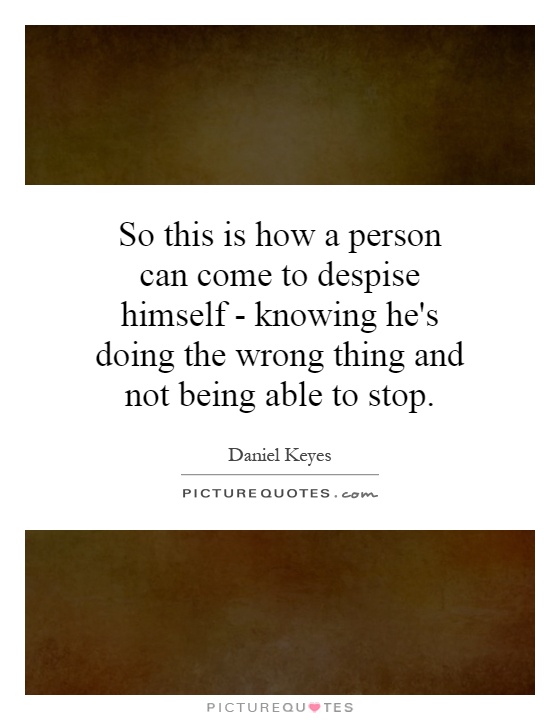So this is how a person can come to despise himself - knowing he's doing the wrong thing and not being able to stop

So this is how a person can come to despise himself - knowing he's doing the wrong thing and not being able to stop
In Daniel Keyes' novel "Flowers for Algernon," the protagonist, Charlie Gordon, experiences a profound internal struggle as he grapples with the consequences of his actions and the realization that he is unable to change his behavior. As Charlie undergoes a groundbreaking experiment to increase his intelligence, he becomes acutely aware of his past mistakes and the harm he has caused others. This newfound awareness leads him to despise himself, as he struggles to reconcile his past actions with his present understanding of right and wrong.Throughout the novel, Charlie's journey is marked by a deep sense of guilt and self-loathing. As his intelligence grows, he begins to remember instances from his past where he mistreated others, particularly his treatment of his family and coworkers. Charlie becomes consumed by feelings of shame and regret, as he realizes the extent of the pain he has caused others. Despite his best efforts to change and make amends, Charlie finds himself unable to escape the consequences of his past actions.
The internal conflict that Charlie experiences is a central theme in "Flowers for Algernon," as he grapples with the complexities of human nature and the capacity for both good and evil within himself. As Charlie's intelligence increases, he becomes increasingly aware of the moral implications of his actions, leading him to question his own worth and morality. This internal struggle is exacerbated by the knowledge that he is unable to change the past or undo the harm he has caused.
Ultimately, Charlie's journey serves as a poignant exploration of the human condition and the complexities of self-awareness. Through his experiences, Daniel Keyes highlights the profound impact of guilt and self-loathing on an individual's sense of self-worth and identity. "Flowers for Algernon" serves as a powerful reminder of the importance of self-reflection and personal growth, as Charlie grapples with the consequences of his actions and strives to find redemption in the face of his own shortcomings.












 Friendship Quotes
Friendship Quotes Love Quotes
Love Quotes Life Quotes
Life Quotes Funny Quotes
Funny Quotes Motivational Quotes
Motivational Quotes Inspirational Quotes
Inspirational Quotes